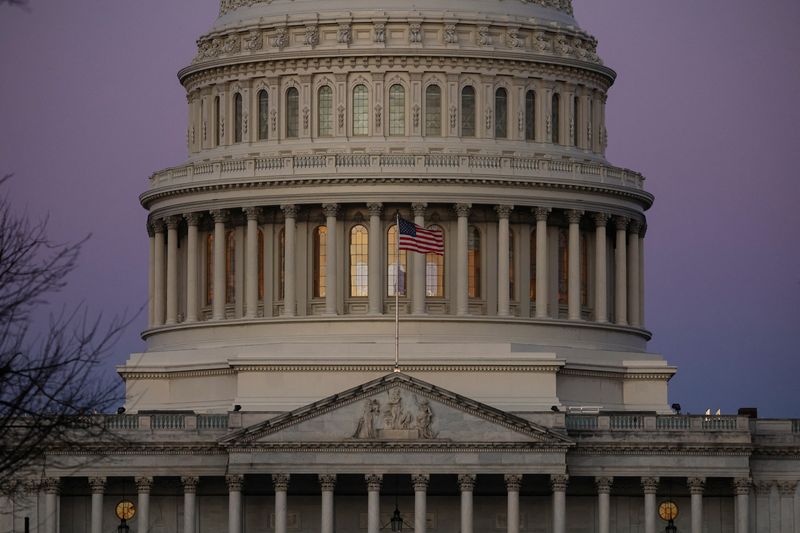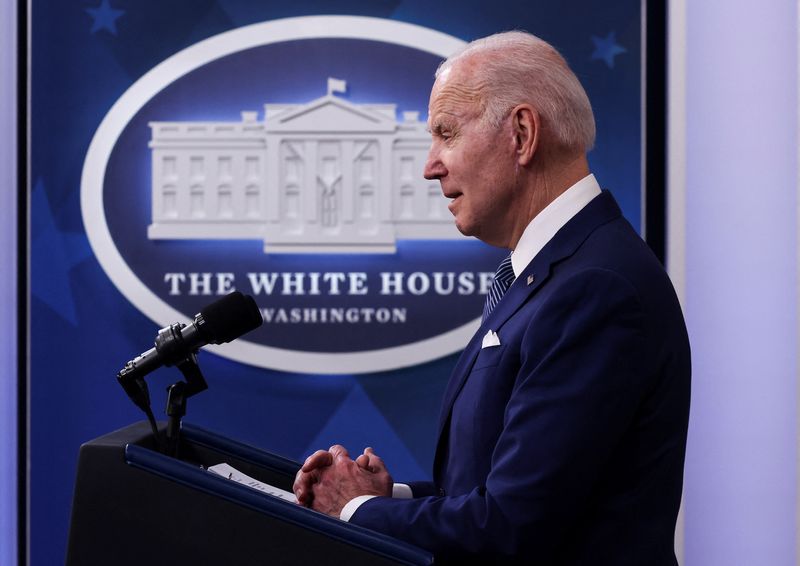By Richard Cowan and David Morgan
WASHINGTON (Reuters) -U.S. congressional negotiators on Monday were nearing a deal on a bill to provide Ukraine with billions of dollars in emergency aid, as well as fund the U.S. government through Sept. 30 and provide money to address COVID-19.
Lawmakers were racing against a midnight Friday deadline for passing such a sweeping bill, before existing funds are exhausted. Failure to meet the deadline would either require another stop-gap funding bill or force partial government shutdowns during a time of international crisis.
Congressional sources with knowledge of the negotiations said Democratic and Republican leaders were hoping to unveil the legislation as early as Tuesday but stressed that talks were not complete. Republicans said they were concerned about spending new money on the COVID-19 pandemic, insisting that billions of dollars allocated last year remained unspent.
"It's coming together. A lot will depend on how they deal with the COVID aid," Senator John Thune, the chamber's No. 2 Republican, told reporters. Thune said he expected any stop-gap bill needed to meet the Friday deadline to be for "a very short amount of time."
Lawmakers acknowledged that a floor schedule truncated by a Wednesday retreat for Democratic lawmakers could pose a hurdle. "That makes the timetable a little tougher," Senator Dick Durbin, the chamber's No. 2 Democrat, told reporters.
Congressman Steny Hoyer, the no. 2 House Democrat, told reporters that he expected the chamber's Rules Committee to meet on Tuesday and for a vote on the House floor to take place no later than Wednesday.
The White House had requested $10 billion in emergency aid for Ukraine, which is trying to fend off an invasion by Russia. On Saturday, Ukrainian President Volodymyr Zelenskiy made a "desperate plea" for help directly to members of the U.S. Congress.
Democrats were also seeking funding to bolster the nation's response to the COVID-19 pandemic -- an expenditure some Republicans questioned.
The third prong of the potential funding bill is thought to appropriate around $1.5 trillion for Washington to run defense and non-defense discretionary spending, which must be renewed each year. The current fiscal year ends Sept. 30.
Democrats hoped to use strong public support for helping Ukraine to pressure Republicans into passing the sweeping "omnibus" bill funding the government, after four bills this fiscal year that extended the previous year's funding levels temporarily.
Congressional Democrats also were trying to start salvaging the unfinished parts of U.S. President Joe Biden's domestic agenda and respond to voters' demands to address inflation while also bolstering high-tech jobs to compete with China.
Last month the government pegged the U.S. inflation rate at 7.5%, a 40-year high far above the Federal Reserve's 2% target.
Prices for everything from rents to gasoline and food have risen at a time when Democrats are trying to improve their standing with voters in the run-up to Nov. 8 congressional elections that will determine whether they can hold onto thin majorities in the Senate and House of Representatives.
Biden, in his State of the Union address last week, sketched out a more moderate path following a year of aggressive spending of around $3 trillion to tame the COVID-19 pandemic and invest in infrastructure improvements.

It is up to the president and his fellow Democrats in Congress to figure out how to unite warring progressive and centrist wings of the party on a narrower series of domestic investments now that his $1.75 billion "Build Back Better" initiative is in ruins.
Senate Republicans, however, could stand in the way of some of these initiatives, citing rising budget deficits. That could prompt Democrats to revisit using a special procedure known as "reconciliation" to pass some legislation without Republican support.
